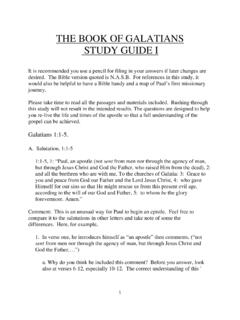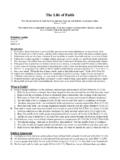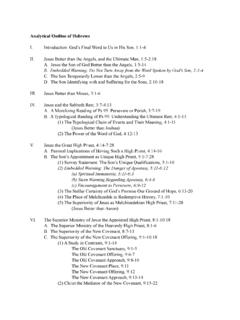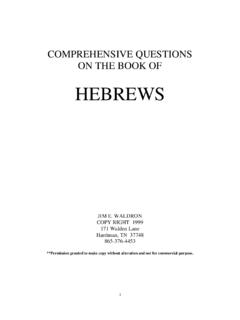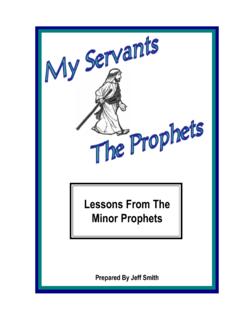Transcription of THE BOOK OF HEBREWS STUDY GUIDE - Bible Classroom
1 1 THE BOOK OF HEBREWS STUDY GUIDE INTRODUCTION Comment: One of the most important things to discover about any Book of the Bible and especially about The New Testament is why it was written and to whom. It appears that every book in the New Testament was written because the recipients were in the midst of some struggle, conflict or confusion about their Christian faith , or with some teacher or group who claimed to be proponents of the truth of the gospel. Each book was written to address or clarify one or more issues facing the church or individuals to whom they were addressed. The Book of HEBREWS is no different. Without knowing who the author is talking to (or about), many Christians apply passages to themselves that are not intended for the faithful in Christ and become confused about the basis of and the security of their own salvation. Chapters six and ten are especially difficult if one does not realize to whom the message is addressed.
2 Before we ask those questions and look into them, I would recommend you possess a good STUDY Bible . The best I have found that is still in print is the Zondervan NASB STUDY Bible . I recommend reading the introduction to the Book of HEBREWS prior to doing the STUDY as well as filling out the first question in this GUIDE . Do more if time allows. Finally, I would suggest you work in pencil. Have a good eraser handy. Changes are inevitable. ---------------------------------------- ---------------------------------------- -------------------- So here are three very important questions to ask. Work on one each week, more if you are able. Perhaps the most important is the question, 1. When the author speaks of we , us you or our , or quotes passages containing one or more of those words, of whom is he speaking (or addressing) and how is he employing these terms? For example, does he ever use an editorial we ?
3 Write your conclusions in the space below. For help and indications of this see HEBREWS chapter (in bold) 1:2, 5, 9-12; 2:3a, 3b; 4-5, 8a, 8b, 9; 3:1, 3, 6,7-11, 12, 13, 14, 15, 19; 4:1, 2, 3, 7, 9, 11, 14, 15, 16; 5:11a, 11b, 12; 6:1, 3, 4, 6, 9-12, 18a, 18b:-20, 7:4, 26; 8:1, 8; 9:14, 24; 10:10, 19- 25, 26, 30, 32-36, 39; 11:3,32, 40; 12:1-10, 12-13, 14-17, 18-29; 13:1, 3-25. 2 Some of the above may not be as relevant as others. Work through them all however. Assistance and the answers are available at the end of the entire STUDY guides. Additional hint: Note the title of the book. It might help to take some paper (a yellow pad or such) make columns or rows and define the answer after each verse you employ. You can then organize or collate the answers into a brief list. This is up to you. I recommend you read the immediate context of each passage as well as it will help. Then supply your basic answers or conclusions below.
4 Again, first create a list of whom he is addressing, speaking to or including. Second, make a note how he uses these terms. In other words, for example, when he uses the word we whom is he including? Do you know why? This will be some work and take time but it is worth it and the key to properly understanding and interpreting the book. _____ _____ _____ _____ _____ _____ _____ _____ The second most important question is: 2. What are the specific issues or concerns the author is dealing with among his readers? In other words, what are they struggling with or resisting? Feel free to expand your previous list. Note their struggle as you are able to glean it from the given texts. _____ 3 _____ _____ _____ _____ _____ _____ _____ The third most important question is: 3. In what way does the author answer or persuade each challenge with which he is faced? Again feel free to repeat the list adding these answers.
5 _____ _____ _____ _____ _____ _____ _____ _____ _____ _____ _____ 4 THE BOOK OF HEBREWS STUDY GUIDE CHAPTER ONE 1. What is the key point of the chapter? _____ _____ _____ 2. Why did the author write this chapter? In other words, what was the intent he had in so doing as it is read by those to whom it was sent? _____ _____ _____ _____ 3. What does beginning this way say about the recipients of the letter? _____ _____ _____ 4. In verse 3, what did Christ s single sacrifice accomplish? Include in your answer, For whom and For how long ? How do you know? Feel free to note other scripture in support of your conclusion. (You might wish to check John 1:29 and I John 2:2 as well as others as you consider your answer). _____ _____ _____ _____ 5 5. Considering verse three, is there, then, anymore need to seek forgiveness for sins? Why or why not? _____ _____ _____ _____ 6. Is there anything more mankind can do to atone for his sins?
6 _____ Why then, do the Catholic and most Christian churches insist that one must confess his sins to be forgiven or do some deed, or first forgive others or do penance in order to be forgiven? _____ _____ 7. If I John 1:9 came to mind, read both the introduction to I John and chapter 1:5-10 in the letter and ask yourself the following questions. A. Could John be using the word we in an editorial sense rather than in a personal sense. B. If John is speaking about believing Christians then how is it that such believers would, in verse 8, say they have no sin since it was because of their sins they came to Christ in the first place? If the we includes Christians then it must also include John Himself! If so, then John is a liar and the truth is not in him either is it? Therefore, how is it that verse 9 can apply to Christians? Work on this if you are confused, it is important, even 8. Is forgiveness the same as salvation?
7 If not, what is the difference and why? _____ _____ _____ 1 To either help you or confuse you more, note that often Christian pastors and teachers apply Matthew 6:12-15 to Christian believers. Is the teaching there true of believers under the New Covenant? If not, why not? If so, then what about Paul s counsel in Ephesians 4:32; Colossians 2:13, 3:12-13, etc. 6 9. Beginning with verse four, the remainder of the chapter (and much of chapter two) is spent on contrasting the place of angels with that of the Son of God. Why do you think the author feels compelled to bring this up and spend so much time on it? _____ _____ _____ _____ _____ 10. What do verses 8-12 say about the Son s identity? _____ _____ 11. In the discussion about whom the author is addressing, why would he bring up Jesus sitting down at the right hand of the Majesty on high 2 and spend so much time on angels if he were writing to Gentiles?
8 _____ _____ _____ _____ 2 For more on this and the answer see: 8:1; 10:11-13 and 12:2. 7 THE BOOK OF HEBREWS STUDY GUIDE CHAPTER TWO 1. What is the "reason" that causes the author to underscore how much closer attention must be given to the message God has spoken in Christ? _____ _____ _____ _____ _____ 2. In verse 3, how can the word we apply to Christians who have come to salvation, including the author, and then be warned (warning himself of course) about neglecting so great a salvation ? Explain what is going on here? _____ _____ _____ _____ _____ 3. Verses 3 and 4 tell us something about the relationship of the author and those with him with the early disciples/apostles. What is it? _____ _____ _____ _____ 8 4. In verse 5, the author notes that God did not subject the "world to come" (of which we are speaking) to the angels. What verses already read could refer to the "world to come?
9 " _____ _____ _____ 5. Verses 6-8 are a quote from Psalm 8. In it we read how God gave dominion over creation to mankind. What is the author suggesting in the last sentence of verse 8? _____ _____ _____ _____ 6. Psalm 8 is definitely about God having given dominion to man over the creation, man who is "made for a little while a little lower than the angels". But in 9 and the following verses, the author attributes to Jesus (superior to the angels) as seen lower than the angels. What is meant by this? _____ _____ _____ _____ 7. How is it that it became possible for God to experience suffering? _____ _____ 8. Christ's death was for whom? _____ 9. What does it mean that "the author of our salvation" is perfected through suffering? (For a hint, see 17-18) 9 _____ _____ _____ 10. In verse 14 the author states that Christ rendered the devil powerless. What does he mean by this? _____ _____ _____ _____ 11. What does the author intend us to understand by verse 15?
10 How does Christ's death free those subject to slavery through fear of death? What slavery? _____ _____ _____ _____ _____ 10 THE BOOK OF HEBREWS STUDY GUIDE CHAPTER THREE 1. The first few verses find commentators split over to whom they are addressed, namely, either to believing Christian "brethren" or to the Jewish "brethren" who have been addressed to this point in the epistle. Consider both sides and then state your conclusion and why. _____ _____ _____ _____ _____ _____ 2. The argument moves from Christ as supreme above the angels to His being supreme above Moses. List reasons the author summons to underscore his argument. _____ _____ _____ _____ _____ 3. In verse six (and 14), it could be argued that, "To be a member of Christ's house is dependent upon 'holding fast to one's confidence and hope' (to the end)." Is there another way to properly understand this verse and, if so, what would it be and why?
